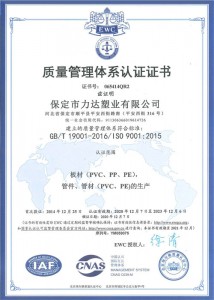Nov . 12, 2024 17:32 Back to list
hdpe sprinkler pipe
The Benefits of High-Density Polyethylene (HDPE) Sprinkler Pipes in Irrigation Systems
In the realm of modern agriculture and landscape management, efficient irrigation systems play a crucial role in ensuring optimal plant growth and conservation of water resources. Among various materials available for irrigation pipes, High-Density Polyethylene (HDPE) has emerged as a preferred choice for sprinkler systems. With its unique properties and versatile applications, HDPE sprinkler pipes offer numerous benefits that enhance the performance and sustainability of irrigation practices.
HDPE is a thermoplastic polymer known for its strength, durability, and resistance to environmental stress. One of the most significant advantages of HDPE sprinkler pipes is their high resistance to corrosion and chemical degradation. Unlike traditional metal pipes that can rust or corrode over time when exposed to varying environmental conditions, HDPE pipes maintain their integrity regardless of the elements. This feature ensures a longer lifespan for the irrigation system, reducing the need for frequent replacements and maintenance.
The Benefits of High-Density Polyethylene (HDPE) Sprinkler Pipes in Irrigation Systems
Water conservation is paramount in modern agriculture, and HDPE sprinkler pipes are designed to promote efficient water use. Their smooth interior surfaces minimize friction, leading to reduced pressure loss and uniform water distribution. This characteristic ensures that water reaches all parts of the irrigated area effectively, reducing waste and promoting healthier plant growth. Furthermore, the ability to easily design and modify sprinkler layouts using HDPE pipes allows for precise watering schedules tailored to the needs of different crops or landscape features.
hdpe sprinkler pipe

Environmental sustainability is another essential consideration in today’s agricultural practices. HDPE is recyclable, thus contributing to a circular economy. When the time comes to replace or upgrade irrigation systems, HDPE pipes can be recycled and repurposed, reducing plastic waste and minimizing the environmental footprint of farming activities. This aspect resonates well with eco-conscious farmers and landscapers, making HDPE an attractive choice for those looking to implement sustainable practices.
The resistance of HDPE to UV radiation further adds to its appeal for outdoor applications. Unlike some other materials that may degrade or become brittle when exposed to sunlight, HDPE pipes are designed to withstand UV exposure, ensuring longevity and reliable performance even in harsh climates. This reliability is crucial for continuous irrigation operations, allowing growers to remain focused on their crops without the constant worry of system failure.
Lastly, the cost-effectiveness of HDPE sprinkler pipes cannot be overlooked. Initial investment costs can be competitive compared to other irrigation materials, and the long-term savings on maintenance and water conservation create a favorable return on investment. By choosing HDPE, farmers and landscapers are investing in a solution that offers both short-term affordability and long-term reliability.
In conclusion, HDPE sprinkler pipes are revolutionizing the way we approach irrigation systems in agriculture and landscaping. Their durability, flexibility, efficient water usage, recyclability, resistance to UV radiation, and cost-effectiveness make them an outstanding choice for modern irrigation needs. As the industry continues to prioritize sustainability and efficiency, HDPE pipes are poised to play a pivotal role in the future of irrigation technology.
-
Durable PP Rigid Sheet: Lightweight, Chemical Resistant Solutions
NewsAug.21,2025
-
PVC Grey Sheet for Extraction: Chemical Resistant & Durable
NewsAug.19,2025
-
Durable PVC Pipe Fittings for Plumbing & Irrigation Needs
NewsAug.18,2025
-
HDPE Steel Belt Reinforced Spiral Corrugated Pipe | High Strength
NewsAug.17,2025
-
HDPE Pipe Fittings: Durable, Leak-Proof Solutions
NewsAug.16,2025
-
Premium CPVC Sheet: High-Temp & Chemical Resistant Solutions
NewsAug.15,2025

